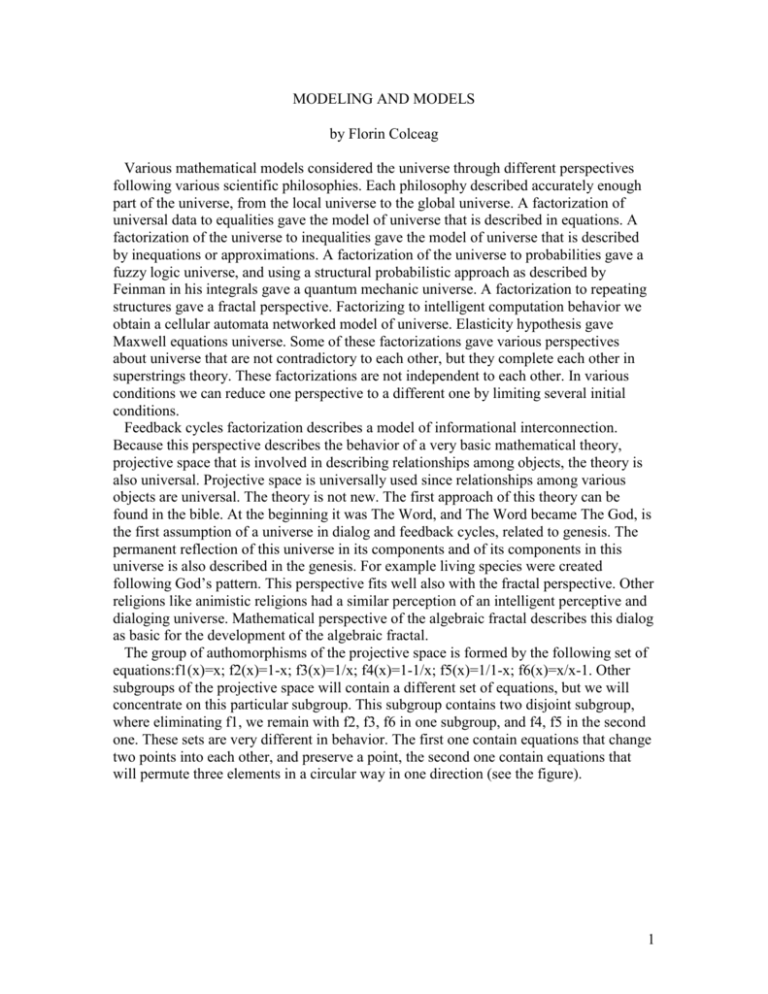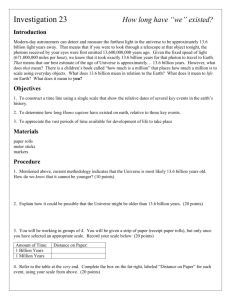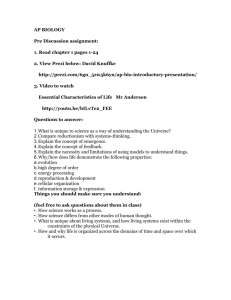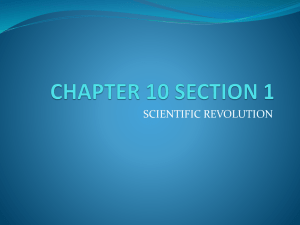Word doc - Austega
advertisement

MODELING AND MODELS by Florin Colceag Various mathematical models considered the universe through different perspectives following various scientific philosophies. Each philosophy described accurately enough part of the universe, from the local universe to the global universe. A factorization of universal data to equalities gave the model of universe that is described in equations. A factorization of the universe to inequalities gave the model of universe that is described by inequations or approximations. A factorization of the universe to probabilities gave a fuzzy logic universe, and using a structural probabilistic approach as described by Feinman in his integrals gave a quantum mechanic universe. A factorization to repeating structures gave a fractal perspective. Factorizing to intelligent computation behavior we obtain a cellular automata networked model of universe. Elasticity hypothesis gave Maxwell equations universe. Some of these factorizations gave various perspectives about universe that are not contradictory to each other, but they complete each other in superstrings theory. These factorizations are not independent to each other. In various conditions we can reduce one perspective to a different one by limiting several initial conditions. Feedback cycles factorization describes a model of informational interconnection. Because this perspective describes the behavior of a very basic mathematical theory, projective space that is involved in describing relationships among objects, the theory is also universal. Projective space is universally used since relationships among various objects are universal. The theory is not new. The first approach of this theory can be found in the bible. At the beginning it was The Word, and The Word became The God, is the first assumption of a universe in dialog and feedback cycles, related to genesis. The permanent reflection of this universe in its components and of its components in this universe is also described in the genesis. For example living species were created following God’s pattern. This perspective fits well also with the fractal perspective. Other religions like animistic religions had a similar perception of an intelligent perceptive and dialoging universe. Mathematical perspective of the algebraic fractal describes this dialog as basic for the development of the algebraic fractal. The group of authomorphisms of the projective space is formed by the following set of equations:f1(x)=x; f2(x)=1-x; f3(x)=1/x; f4(x)=1-1/x; f5(x)=1/1-x; f6(x)=x/x-1. Other subgroups of the projective space will contain a different set of equations, but we will concentrate on this particular subgroup. This subgroup contains two disjoint subgroup, where eliminating f1, we remain with f2, f3, f6 in one subgroup, and f4, f5 in the second one. These sets are very different in behavior. The first one contain equations that change two points into each other, and preserve a point, the second one contain equations that will permute three elements in a circular way in one direction (see the figure). 1 These two sets will reflect into each other using a mathematical protocol, creating the basic structure of a feedback, and the possibility for a dialog. In a similar way in which two parallel mirrors will reflect one image at infinity creating a perspective, the reflections created by these feedback cycles will be transformed in new feedback cycles of superior order, this time isomorphic with the first subgroup that contain f2, f3, and f6. The second one containing circular permutations can be constructed and added forming so the second mirror. In fact this procedure describes in a consistent way the initial word that created the universe considering the religious perspective, and fits well with cellular automata model of universe, with the model of elastic universe, and using various mathematical procedures can fit well with all the other models of universe. This model gives us the same lesson that catastrophe theory gives: a small amount of information can change the balance of information by creating big storms of information. It also gives a perspective about what cellular automata will really mean considering this structure of dialogues that forms feedback cycles. Maybe this model will break our original ideas about how important we are, about life, and matter, developing more responsible behaviors. It is extraordinary how each model developed new human social behaviors, each one releasing humanity from wrong ideas. The model of feedback cycles and cellular automata created by using these feedback cycles change also many human perspectives: for example intelligence is not only a human quality, but at various levels of complexity is a universal property. This idea is not new, it was described by Von Neuman in his cellular automata theory, and the perception 2 of the cosmic intelligence was permanent in the history. Feedback cycles model will give the chance for another idea to change: The planetary ecosystem (Gea) has its own intelligence, and possibility to reply. No specie is randomly developed on the Earth each one is part of a global metabolism. No culture or religion is spontaneously appeared, each one has a metabolic meaning on this planet, and is part of a higher metabolism. This theory is not new, Plato said similar things 35 centuries ago, but now these relationships can be described using computer programs, and algebraic fractal theory that describes feedback cycles behavior. Another interesting quality of the feedback cycles theory based on fractal varieties is symmetry. Various transformations can create one kind of symmetry very similar with Gauge transformations symmetry in super string theory. Super string theory is also based on projective space, so these two common links can determine a different connection between elasticity, hidden dimensions, and feedback cycles. Feedback cycles also contain hidden dimensions. As long as each knot can be described as a feedback cycle, and the set of new feedback cycle is consistent creating a second-degree feedback cycle with two dimensions instead of one, the connection with super string theory is not impossible. More than these both theories describe matrices that characterize their internal structures. Feedback structures start also from another common characteristic with super string theory but at a very different level. This characteristic is the existence of two separate structures at the basic level of both theories, and the existence of complex dimension. For feedback cycles theory this complex dimension will describe the fixed point of f4, and f5, that are complex. There is a big distance from olomorphic and anti-olomorphic structures and f4, and f5 set. This distance can be covered by more complex feedback structures able to develop more complex behaviors, and more complex cellular automata. It is possible to find a way in which to describe these cellular automata in a strict connection with the elastic universe presupposed by super string theory. In this direction we have also an encouraging clue. When we take the metric part of the afine spaces build on the fractal varieties, we will notice interesting phenomena. A segment on the line will be isomorphic with an angle in the plane. By applying a rotation of the angle in the space we will obtain a cone, as well as by applying a rotation of the segment in the plane we will obtain an angle. In the four dimensional space by rotating the cone we will obtain a hyper-cone or a torus. Each of these objects will contain the segment, the angle, the cone, etc in their internal structure. In superstring theory something similar is happening: calabi yau equations will contain in their fields of solutions cones and toruses. These observations are very far away from a connecting theory between super string theory and feedback cycles theory, the last theory being only at the beginning. But a connection would be wonderful. To be able to say that matter has intelligence and possibility of sharing information at any level of complexity, that the universe is an infinity network of communication, and that we are not singular in this world able to understand our environment can be extraordinary. We know this from various religious philosophies like Buddhism, but we never trusted the philosophy. Maybe we will trust scientifically and mathematical results. Maybe it is the time for our human species to end its childhood and to become adult and responsible. More responsible people, probably using more complex personal philosophies about the universe, will solve various increasing crises. 3









